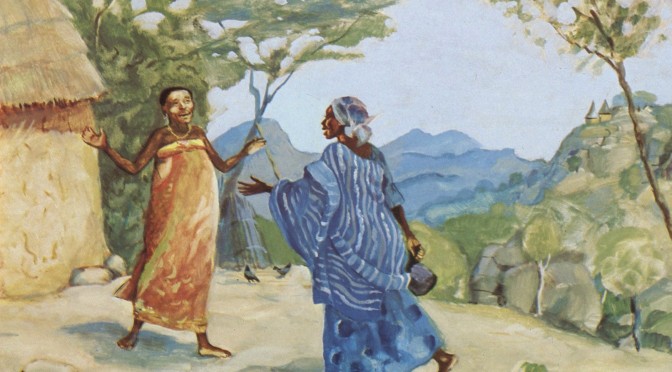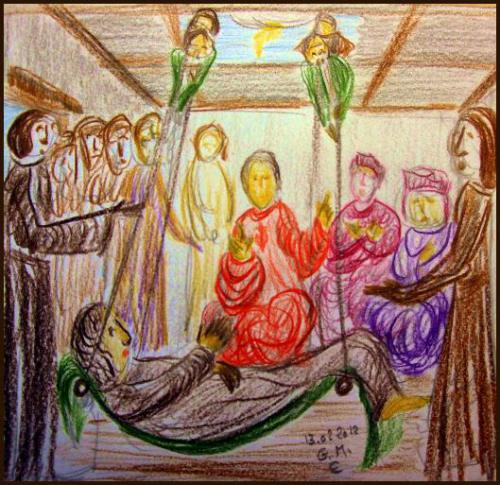Caitlin Trussell with Augustana Lutheran Church, December 20, 2015
[sermon begins after the Bible reading]
Luke 2:39-56 In those days Mary set out and went with haste to a Judean town in the hill country, 40 where she entered the house of Zechariah and greeted Elizabeth. 41 When Elizabeth heard Mary’s greeting, the child leaped in her womb. And Elizabeth was filled with the Holy Spirit 42 and exclaimed with a loud cry, “Blessed are you among women, and blessed is the fruit of your womb. 43 And why has this happened to me, that the mother of my Lord comes to me? 44 For as soon as I heard the sound of your greeting, the child in my womb leaped for joy. 45 And blessed is she who believed that there would be a fulfillment of what was spoken to her by the Lord.” 46 And Mary said, “My soul magnifies the Lord, 47 and my spirit rejoices in God my Savior, 48 for he has looked with favor on the lowliness of his servant. Surely, from now on all generations will call me blessed; 49 for the Mighty One has done great things for me, and holy is his name. 50 His mercy is for those who fear him from generation to generation. 51 He has shown strength with his arm; he has scattered the proud in the thoughts of their hearts. 52 He has brought down the powerful from their thrones, and lifted up the lowly; 53 he has filled the hungry with good things, and sent the rich away empty. 54 He has helped his servant Israel, in remembrance of his mercy, 55 according to the promise he made to our ancestors, to Abraham and to his descendants forever.” 56 And Mary remained with her about three months and then returned to her home.
[sermon begins]
So much in life turns on a single moment. These turns are defining. People we meet, plans we make, can take us in a whole new direction. We play the game in my family occasionally reflecting on those turns. It’s a game of “what ifs.” A lot of the what-ifs are benign. Some of them aren’t. You know this game. In one way or another we all do it. Imagining whatever is happening in life differently because of the turns we make either voluntarily or because something happens to us.
Gabriel’s annunciation to Mary happens a few moments before her departure to the Judean hill country. She was left perplexed and pondering the angel Gabriel’s greeting. He reassured her, “Do not be afraid, Mary, for you have found favor with God.”
Gabriel announces that she is to have a holy child called “Son of God.” Mary receives and accepts the annunciation by saying, “Here am I, the servant of the Lord; let it be with me according to your word.” Then the angel leaves her. Mary’s life now takes a major turn. There is no going back to the way things were before. The what-ifs are futile.
Right away, Mary turns and heads out the door. “In those days Mary set out and went with haste…” Why is she in a hurry? Why make haste? An easy answer might be that she’s excited. Gabriel told Mary that her relative Elizabeth is also pregnant. Mary could simply want to spend some time with her. But let’s imagine Mary’s situation more thoroughly. Regardless of her actual age, Mary is likely a very young woman. She’s newly engaged. In first century terms, she is as good as married. Now she’s unexpectedly pregnant. And she makes haste to Elizabeth.
Gabriel told Mary not to be afraid but who wouldn’t be? I find that when the Bible pops up with the reassurance not to fear that there’s already something scary happening. Anyone would be afraid given the circumstances. It is no different here. Not only does an angel show up but Mary’s life is at risk. Whether it’s at risk because someone might hurt her due to her pregnancy or at risk because she could be turned out of her home with very few options.
Mary’s life is at risk. She goes to Elizabeth. They greet. And Mary speaks. What follows as she speaks is significant theologically for two reasons. The first has to do with God’s purpose in Jesus.[1] The second is what God brings to bear through Mary herself.
In Jesus, God purpose extends to non-Jews the covenantal promises made long ago through Abraham.[2] Mary says, “He has helped his servant Israel in remembrance of his mercy, according to the promise he made to our ancestors, to Abraham and to his descendants forever.” Culturally, there has been violence carried out against the Jews through the millennia. The violence has often been supported and instigated by Christians literally leading the march based on one interpretation of the crucifixion of Jesus. As Anne Lamott says — ‘You can safely assume you’ve created God in your own image when it turns out that God hates all the same people you do.’ Interpretation matters as the pages of the Bible turn.
Mary’s words in the Magnificat create a pause in which to wonder about anti-Semitic violence supported by supersessionist Christian self-righteousness – a self-righteousness that would attempt to usurp God’s righteous eternal covenants. Genesis 21 gives a similar pause as we live alongside our cousins of faith in Islam. God’s blesses Ishmael who is Abraham’s son by Hagar. Ishmael is in the genealogy of Muhammed.[3] God tells Hagar regarding Ishmael that, “I will make a great nation of him.” Once again, interpretation matters as the pages of the Bible turn.
On December 8th, Religion News Service ran an article about Orthodox rabbis signing a document acknowledging Christianity as an expansion of God’s covenant with the Jewish people through Abraham.[4] Here’s a direct quote from the article:
“We understand that there is room in traditional Judaism to see Christianity as part of God’s covenantal plan for humanity, as a development out of Judaism that was willed by God,” said Rabbi Irving Greenberg, a signatory to the statement, titled “To Do the Will of Our Father in Heaven: Toward a Partnership between Jews and Christians.”
In the same Religion News article, Rabbi Joseph Soloveitchik, a 20th century Orthodox rabbi held in high esteem, was quoted as having said, “each faith community is unique and entitled to the integrity of its own positions, which are neither negotiable, nor able to be fully understood by people from other faith traditions.” I’m inclined to agree with Rabbi Soloveitchik. There are such things as religious commitments by way of faith. But Mary’s words about God who scatters the proud and brings down the powerful from their thrones might challenge us lest we get too high and mighty by way of our own opinion and interpretation.
Mary praises God for calling her to be a God-bearer. She accepts God’s call at great risk to herself. Mary turns toward the safety of Elizabeth and Zechariah’s home for a while. Not forever. The story tells us that she stays there about three months before returning to her home. The time comes to turn back the way she came.
Advent Adventure was here a couple of weeks ago. Food, service project, and crafts filled the Fellowship Hall. I had the chance to tell a story. My goal was to keep the story short and focused. I learned my lesson after last year’s book time with kiddos was discombobulated by everything happening around us and the cookies inside of us. The kids and I talked about what makes an adventure. We talked about Mary’s Advent adventure and what makes an adventure – Star Wars being one example that came to mind easily for everyone. Story time was super fun although the word “adventure” doesn’t quite fit. It’s too romantic of a word for what she goes through on her own to Elizabeth’s home and then with Joseph to Bethlehem and, later, Egypt to escape Herod. Mary makes tough decisions, determined to live into what God is calling her toward. She protects herself and her pregnancy by turning toward Elizabeth and she returns home a few months later risking everything.
By baptism, we are God-bearers along with our ancestor in the faith, Mary – the lowly servant and the blessed mother of Jesus. Like Mary we realize that faith often involves risk over safety. You see, as Christians, we do not live as people without hope. As Christians, we get to live as people of good courage as we are turned by God toward the people around us. Called by God into a life of faith, into this world that God so dearly loves, we turn toward God realizing that God is already turned toward us. God turned to us in skin and solidarity by way of a blessed mother’s body through the power of the Holy Spirit for the sake of the world and for you – imperfections, gifts, and all. With Mary, our souls magnify the Lord and our spirits rejoice in God our Savior. For God so loves the world and God so loves you. Amen.
[1] Robert C. Tannehill. The Narrative Unity of Luke-Acts: A Literary Interpretation. (Philadelphia: Fortress Press, 1986), 20-32.
[2] Genesis 15
[3] Rosemary Pennington. “Ishmael and Islam.” Muslim Voices, December 10, 2008. http://muslimvoices.org/ishmael-islam/
[4] Lauren Markoe. “Orthodox rabbis’ statement calls Christianity part of God’s plan.” December 8, 2015. http://www.religionnews.com/2015/12/08/orthodox-rabbis-letter-calls-christianity-part-gods-plan/
__________________________________________
In response to the sermon, the people sing a song called the Hymn of the Day. Today’s we sing verses one and two of “Canticle of the Turning” based on Mary’s Magnificat. Link to full lyrics:
http://www.spiritandsong.com/compositions/30269
Canticle of the Turning
- My soul cries out with a joyful shout
that the God of my heart is great,
And my spirit sings of the wondrous things
that you bring to the ones who wait.
You fixed your sight on your servant’s plight,
and my weakness you did not spurn,
So from east to west shall my name be blest.
Could the world be about to turn?Refrain
My heart shall sing of the day you bring.
Let the fires of your justice burn.
Wipe away all tears, for the dawn draws near,
and the world is about to turn!2. Though I am small, my God, my all,
you work great things in me,
And your mercy will last from the depths of the past
to the end of the age to be.
Your very name puts the proud to shame,
and to those who would for you yearn,
You will show your might, put the strong to flight,
for the world is about to turn.











